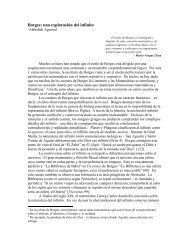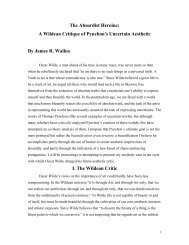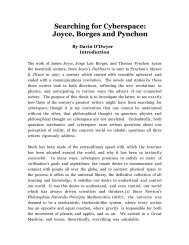And A Very Good Time It Was: A Short Life of ... - The Modern Word
And A Very Good Time It Was: A Short Life of ... - The Modern Word
And A Very Good Time It Was: A Short Life of ... - The Modern Word
You also want an ePaper? Increase the reach of your titles
YUMPU automatically turns print PDFs into web optimized ePapers that Google loves.
This move severed Joyce from Stanislaus almost completely. Already sour at his brother for<br />
not dedicating Dubliners to him (as Joyce had promised he would), for removing his character<br />
(Stephen Dedalus’ brother Maurice) from Portrait, and finally for never showing any gratitude<br />
for supporting him and his family in Trieste, Stanislaus was happy to see him go. As Joyce put it<br />
later in a footnote to Herbert Gorman’s biography, “<strong>The</strong> relations between the two brothers<br />
practically ends here.” 152<br />
Once in Paris Joyce continued work on the Circe episode, and on July 11, 1920, he met the<br />
woman who would eventually publish Ulysses. Sylvia Beach was the daughter <strong>of</strong> a Presbyterian<br />
minister from Princeton. <strong>The</strong> previous November she had opened her famous Shakespeare and<br />
Company bookship in Paris. Her close friend (and lover) was another bookseller, Adrienne<br />
Monnier, and it was at Monnier’s house that Beach met Joyce. Only later did her bookshop<br />
become Joyce’s favorite hangout, as it was already with the rest <strong>of</strong> literary Paris. Over the next<br />
ten years Beach and her bookshop remained Joyce’s “bank, post <strong>of</strong>fice, c<strong>of</strong>fee shop, library, and<br />
home away from home.” 153<br />
On August 15 there took place one <strong>of</strong> the more humorous meetings in literary history. T. S.<br />
Eliot, traveling with Wyndham Lewis, had been entrusted with a package from Pound that he was<br />
to deliver to Joyce. <strong>The</strong>y met Joyce in the afternoon, Giorgio with him. Wyndam Lewis’<br />
reminiscences on this scene are priceless: after some preliminary talk Eliot rose histrionically and<br />
made the formal presentation <strong>of</strong> the package. As Joyce unwrapped the package, Lewis says,<br />
“<strong>The</strong>reupon, along with some nondescript garments for the trunk—there were no trousers, I<br />
believe—a fairly presentable pair <strong>of</strong> old brown shoes stood revealed, in the centre <strong>of</strong> the<br />
bourgeois French table....” 154 Joyce sent his son home and (partly out <strong>of</strong> embarrassment, partly<br />
just being himself), took Eliot and Lewis out to dinner, spent as much as he could, and tipped<br />
extravagantly. Eliot, who found Joyce to be exceedingly arrogant, nevertheless noted a week later<br />
that, “He is obviously the man who wrote his books—that is, he impressed you as an important<br />
enough personage for that.” 155<br />
By now Joyce had been receiving regular (and large) donations from an anonymous patron,<br />
and ten days after meeting Eliot and Lewis more money came. Joyce was as impatient for the<br />
opportunity to thank someone as he was to deride them, and he forced the patron to be<br />
anonymous no more. <strong>It</strong> was Harriet Weaver. At first embarrassed, she soon made it simple that<br />
her hope was to free his “best and most powerful and productive years” from the usual financial<br />
difficulties. 156 (Indeed, it is hard to imagine Finnegans Wake being written under any other<br />
circumstances) <strong>It</strong> is estimated in today’s money that over twenty years Weaver gave Joyce nearly<br />
a million dollars. Of course Joyce could never remove himself from financial worries, and while<br />
Joyce and Weaver’s relationship would be strained for various reasons (her brief lack <strong>of</strong> support<br />
for Finnegans Wake, her disapproval <strong>of</strong> his drunkenness and their differences over how to handle<br />
Lucia’s later illness), they always remained close, and Joyce never forgot how much he owed her.<br />
When he remarked later about Sylvia Beach that “All she ever did was to make me a present <strong>of</strong><br />
the ten best years <strong>of</strong> her life,” 157 he could have said the same about Miss Weaver. For a man<br />
habitually cynical about women, it was the presence <strong>of</strong> three (Nora, Weaver, and Beach) that he<br />
could have never done without.<br />
After quickly writing the Eumaeus episode, Joyce moved onto <strong>It</strong>haca, Bloom’s walk with<br />
Stephen to his house. Rendered in the driest prose, the episode is comprised <strong>of</strong> a series <strong>of</strong><br />
questions and answers <strong>of</strong> such scientific exactitude that<br />
Bloom and Stephen thereby become heavenly bodies, wander[ing] like the stars<br />
at which they gaze. <strong>The</strong> last word (human, all too human) is left to Penelope.<br />
This is the indispensable countersign to Bloom’s passport to eternity. 158





